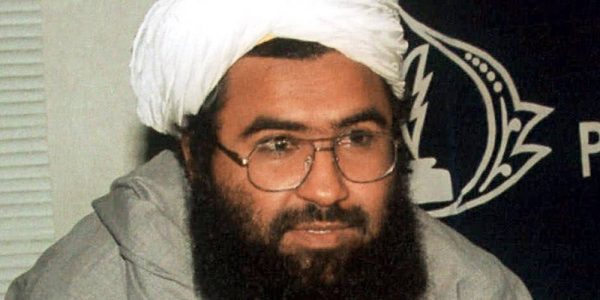
US Offical: Countries need to move forward in listing Masood Azhar as terrorist
A senior US official, on a visit to Pakistan, has said that countries need to move forward on the issue of listing Jaish-e-Mohammed chief Masood Azhar as a global terrorist, ensuring that the United Nations’ process in taking a corrective action against extremists works well.
The United Nations Security Council is expected to meet on Wednesday, amid indications that China could lift its hold on the proposal to blacklist Azhar, who is based in Pakistan.
China had put a hold in March on a fresh proposal by the US, UK and France to impose a ban on the chief of the JeM which claimed responsibility for the deadly Pulwama terror attack. The proposal was the fourth such bid at the UN in the last 10 years to list Azhar as a global terrorist.
In 2009, India had moved a proposal by itself to designate Azhar.
We would encourage the parties to move forward with the designation (of Azhar). It reaffirms the centrality of UN and UN role in designating terrorists, Alice Wells, Principal Deputy Assistant Secretary of State for South and Central Asian Affairs, said here on Wednesday.
We believe designation process should be technical in nature, even assessment of evidence and countries moving forward to ensure that UN process works and works well and the international community is able to take corrective action against any terrorist, whoever they are, wherever they are located, she added.
Talking about the Financial Action Task Force’s assessment of Pakistan’s measures to stop terrorist financing, she said, we have heard some positive reports and partly seen some positive actions, but FATF itself will determine whether it meets the level of identifying and enforcing (restrictions on) the ability of these groups to fundraise and organise.
Interacting with a group of journalists at the US Embassy here, she said that there was no “evidence” suggesting that India was using Afghanistan for spreading terrorism in Pakistan.
Pakistan has long been expressing its concerns regarding India using the Afghan soil to create trouble and often presented as evidence the case of former Indian naval officer Kulbushan Yadhav, who has been sentenced to death by a Pakistani military court on charges of “espionage and terrorism” after a closed trial in April 2017.
I don’t have the evidence what you’re referring to, but our policy is clear that no country should support non-state actors, she said.
Pakistan claims that its security forces arrested Jadhav from restive Balochistan on March 3, 2016 after he reportedly entered from Iran.
However, India maintains that Jadhav was kidnapped from Iran where he had business interests after retiring from the Indian Navy. Jadhav’s sentencing had evoked a sharp reaction in India.
Commenting on Pakistan’s concerns regarding India’s role in creating trouble in Balochistan, she urged regional countries to respect each other’s sovereignty without naming India, the Express Tribune reported.
We recognise and respect the territorial integrity and sovereignty of Pakistan. We do not support any separatist or irredentist movements, she said, adding, We think it’s critical that nations of this region respect one another and work to achieve peace and economic growth.
Wells, who was part of delegation headed by US special envoy Zalmay Khalilzad, said the US would never condone or support any use of “terrorist proxies against another country.”
We have been working very actively with Pakistan to combat whether it’s al Qaeda or TTP (Tehrik-i-Taliban Pakistan). Any terrorist attacking Pakistan is enemy of ours and we share very strong counter-terrorism objectives in defeating extremist forces, she added.
Wells also said the US had no information regarding Pakistan Army’s latest allegations that Afghan and Indian secret agencies were funding the Pashtun Tahafuz Movement (PTM), an ethnic Pashtun rights group based in tribal region.
On the possibility of resumption of dialogue between Pakistan and India, Wells said Pakistan needed to demonstrate its commitment to ensure that militant groups can’t take advantage of Pakistani soil.
She said the US welcomed Prime Minister Imrans Khan’s public statements affirming his resolve not to allow Pakistan’s soil to be used against any other country.
I would positively note that many comments the prime minister has made in public underscoring his government’s commitment to moving away from non-state actors to ensuring that the national action plan that Pakistan has forged is implemented, she said.
Clarifying US’ stand on the China-Pakistan Economic Corridor (CPEC), Wells said while Washington did not object to infrastructure investment by China, the question remains whether such projects meet the international standards.
She argued that such investments should be transparent, sustainable and produce benefits for the country.
So any concern that we have over CPEC projects is with regards to the transparency, the efficacy and the sustainability of the loans.
This is an issue that is not Pakistan specific. We have expressed this concern about belt and road initiative more broadly,” she said
In a separate statement issued by the US embassy, envoy Khalilzad expressed appreciation for Pakistan prime minister’s recent remarks in support of the peace process and broader vision for stability and prosperity in the region.
Source: Business Standard





